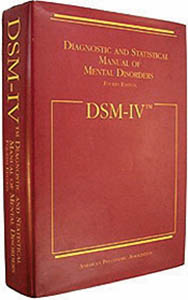
When I was a student pursuing my master’s at Fordham’s School of Social Work, one of the classes I took was titled “Advanced Clinical Assessment and Diagnosis.” The class was based on the DSM-IV (the “bible” for all therapists) and helped us develop an understanding of abnormal psychology, and the various pathologies and diagnoses.
There was a fascinating occurrence that kept repeating itself throughout the course. Every time we learned about a new diagnosis I found myself applying the label to people I knew. “Hmm, he is a little bipolar, she is quite narcissistic, he sometimes seems like a borderline, she is often depressed, and he is majorly ADHD.” Then, as I thought about it more, I began to realize that I had a little of each diagnosis and I began to label myself with each disorder (especially certain ones)!
My professor reassured us that most students who are candid with themselves have a similar experience. Most people are, at least at times, somewhat bipolar, narcissistic, depressed, anxious or obsessive, and suffering from bouts of dementia. What differentiates normal experience from a psychiatric diagnosis is whether the symptoms impede one’s daily living. When a person is so overcome with anxiety that he cannot function, so depressed that she can’t pull herself out of bed, or has such erratic mood swings that people cannot stand being around him, then it enters the realm of “disorder” and must be dealt with appropriately.
I have been thinking about that experience as we read the parshiyos of Chumash Bereishis. We learn about the noble lives of the patriarchs and encounter their numerous adversaries, e.g. Yishmael, Lot, Lavan, and Esav. We carefully analyze how the patriarchs righteously traversed all of their challenges and dealt with each antagonist in a different manner. In doing so, we learn how we can deal with the adversaries and villains we, too, encounter in our daily lives.
But there is another important component that we often fail to focus on, i.e., that there is a little bit of those adversaries within each of us. We, too, can, at times, be avaricious like Lot, duplicitous like Lavan, mock like Yishmael, and cunningly antagonistic like Esav.
Reading about the tragedies of individuals who had so much potential, and yet failed miserably despite being in such close proximity to the patriarchs and matriarchs, helps us think about our own shortcomings, and whether we have weathered his own personal tempests.
So basically I guess I am saying that we are all a little crazy. But lucky for us, we have access to the best therapists to help us normalize our eccentricities. They are Rashi, Ramban, Sforno and all of our sages who teach us how to understand the timeless lessons of the Torah.
And best of all, you don’t have to deal with your HMO before making an appointment.
Rabbi Dani Staum, LMSW, is the rabbi of Kehillat New Hempstead, as well as guidance counselor and fifth grade Rebbe in ASHAR, and principal at Mesivta Ohr Naftoli of New Windsor, and a division head at Camp Dora Golding. He also presents parenting classes based on the acclaimed Love and Logic methods. His email address is: [email protected]. His website is: www.stamtorah.info.
By Rabbi Dani Staum













